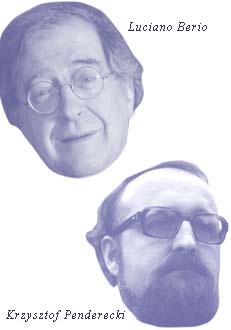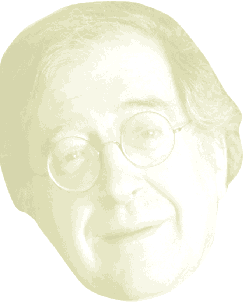Out of the Past
The avant-garde in its twilight years.
Luciano Berio at Carnegie Hall, New York City, Oct. 21, 1997
Krzysztof Penderecki at the New York Philharmonic, New York City, Oct. 30, 31, and Nov. 1, 1997

Forty years ago, when artists still believed in progress, two revolutionary young composers named Luciano Berio and Krzysztof Penderecki undertook a musical purge. World War II was over, Europe wanted to scrub off its history, and Berio and Penderecki, an Italian and a Pole, were two of the music world's most ruthless and effective slate-cleaners. Berio disassembled traditional techniques of playing, instrument by instrument, in a series of solo pieces called Sequenze, the most famous of which was Sequenza III (1966) for unaccompanied voice--eight minutes of theatrical giggling, clicking consonants, and heavy breathing. In 1960, Penderecki exploded the lyrical associations of the string orchestra in his Threnody for the Victims of Hiroshima for 52 stringed instruments, a brutal piece commemorating an act of violence.
Both of these composers came to New York last month. Berio, accompanied by technicians from Centro Tempo Reale, his electronic-music headquarters in Florence, and the Orchestra della Toscana, performed his work-in-perpetual-progress, Ofanim. The following week, Penderecki conducted a New York Philharmonic performance of Threnody and gave the New York premiere of a recent symphony--No. 5, written in 1992.
B erio is 72 now, Penderecki 64 and, like revolutionaries everywhere, they belong to a generation that has fallen into disrepute. Many young composers view musical modernism with distaste, much as Berio and Penderecki and their peers viewed late Romanticism in their day. These two, along with the rest of their generation, are often charged with having reduced music to a set of games, making it schematic and emotionally barren. The decades of modernism, however, produced music that was vehement (George Crumb's Black Angels), haunted (Elliott Carter's Night Fantasies), humorous (Berio's Sequenze), dazzling (Wijtold Lutoslawski's Les Espaces du Sommeil)--not to mention music that wasn't modernist at all. If audiences came to believe that the compositions of their time were mechanical, it is largely because they listened less to the music than to what the artists said about themselves.
"I wrote Threnody thinking only about structure [and] architecture," Penderecki once said. "I don't really care much about emotions." The music preceded the title, he insisted, and it would be wrong to hear nuclear-age despair in the clangor of bows being bounced and scraped on the strings, of fingers tapping on wood, or of the siren wails produced by floods of sliding glissandi. Wrong, perhaps, but inevitable. Threnody is expressive in spite of itself.
Berio also denied his passions. In an interview he gave in 1985, he described an early encounter with opera, when he was 13. "The radio was carrying La Bohème," he recounted, "and I suddenly found my eyes filling with tears. So, to hide them, I dropped a spoon on the floor. ... Anyway, I soon got over the emotional excitements of La Bohème."

His music suggests otherwise. Ofanim, a long biblical cantata for two matched ensembles of wind, brass, and percussion; two boy choirs; female voice; and computer; is a highly operatic piece of the sort Puccini would have understood. At the New York performance, the Israeli singer Esti Kenan Ofri spent most of the time shrouded in drapery and darkness at the foot of the podium, slowly rising and writhing only for the keening solo that ends the piece, a recitative redolent of Middle Eastern rites. An earlier trombone cadenza was a modernist echo of the ram's-horn blast that ushers in the Jewish New Year.
There were plenty of "emotional excitements." The music rolled like a wave through a dozen episodes, each of them based on a passage from Ezekiel or the Song of Songs. (The title, which means "wheels" in Hebrew, refers to an apocalyptic vision in Ezekiel.) It crested on choruses of screaming boy sopranos and furious churning from the instruments, then abated to quiet intonations and still chords, filigreed by a solo clarinet. It may just have been heat or hunger that caused one boy chorister to faint as if on cue as soon as the last chord faded during a rehearsal that morning, but it was easy to believe he had been felled by the music.
The real problem with the most innovative music of the postwar era is not so much that it is dry as that it can sound dated. Penderecki's Threnody is a good example. In the decades since it was composed, orchestras have been asked to make noises that sound much worse than Penderecki's squeaks and blurts. In the meantime, Penderecki has been trying to recast himself as a grand old symphonist in the Brucknerian mold. His Symphony No. 5 lasts only 35 minutes--no longer than a Mozart symphony--but it has the feel of something weighty, sprawling, and epic. Great blasts of brass; a fugue built on a long, solid cable of a theme; climaxes that follow each other with the deafening regularity of an artillery barrage; horns that blare from the balconies: Nearly every moment seems calculated to matter. When 19th-century composers wanted to be solemn, they invoked the Baroque: Thick counterpoint and a good old passacaglia--variations over a repeating bass--never failed to sound lofty. Penderecki cranks up 19th-century Baroque-style rhetoric into something both stentorian and shrill. His passacaglia sounds less like Bach than like Bruckner imitating Bach. He has come a long way from the man who once proudly claimed to have "destroyed normal harmony and notation."
B erio, on the other hand, hasn't needed to rediscover history. In a landmark 1968 work, the wryly named Sinfonia, Berio made a musical palimpsest, thickly layering his new music and a jumble of spoken words over the foundation of a Mahler symphony. In Ofanim, Berio has combined his search for new technologies with a reverence for rituals and ancient theater: Microphones picked up sounds from the stage and computers tossed them to speakers in the balconies and back again, letting chords and passages hang in the air like incense.
The sacramental feel of Ofanim is both apt and ironic, for both composers came to fame for bringing down temples. Four decades later, Penderecki has joined the ranks of those who renounce the achievements of his generation; Berio remains unabashedly highbrow and staunchly atonal, a true avant-gardist. When the next modernist revolution comes around, he'll be ready.